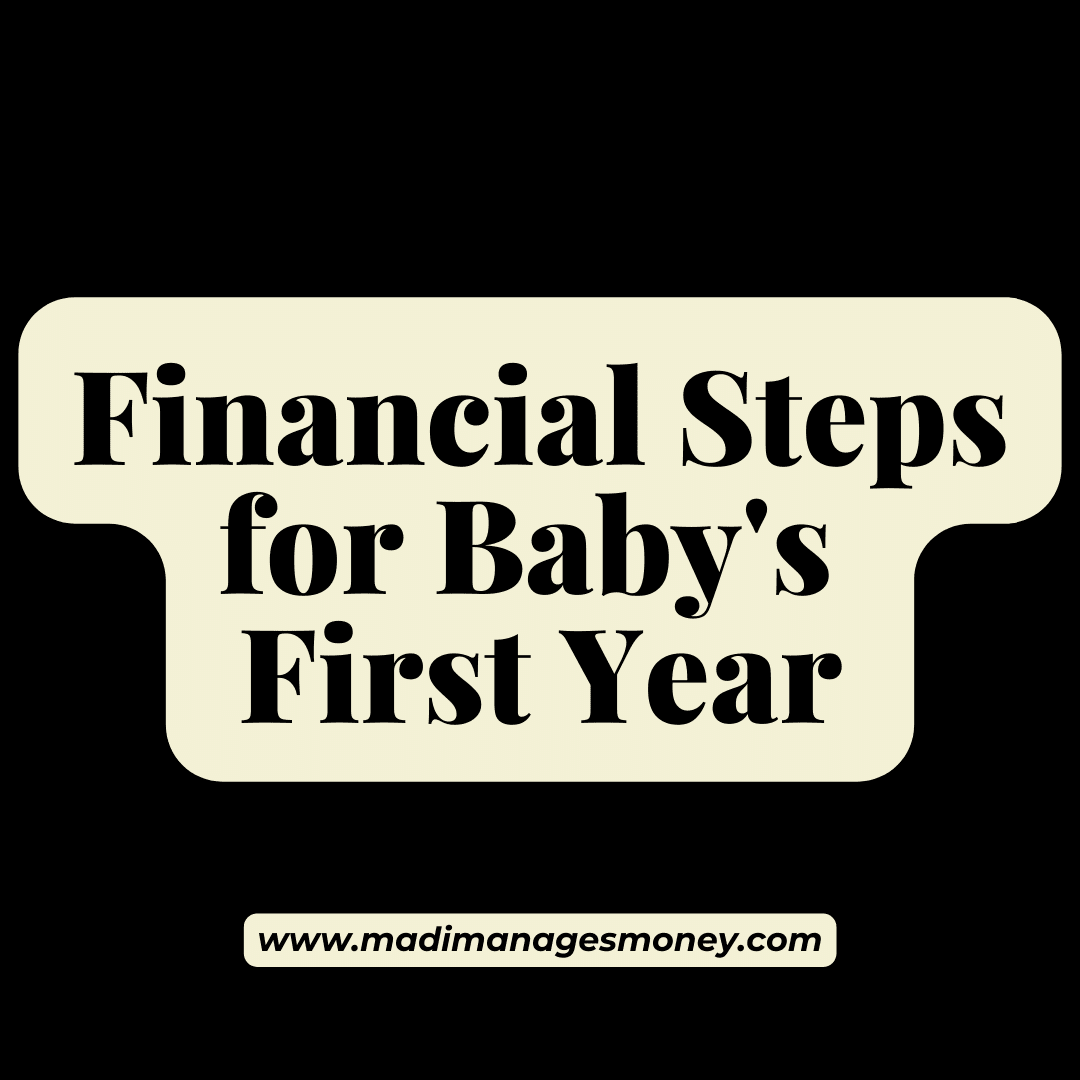Here are 8 key financial steps to take during your baby’s first year of life.
You already know how impactful your baby’s first year is. With their whole life ahead of them, seemingly small actions now can improve their entire life.
When it comes to money, this totally applies.
This is the second article that builds on a first: The Ultimate Financial Checklist for Pregnancy.
Add baby to your health insurance.
Within your baby’s first 30 days, add them to your health insurance. This doesn’t happen automatically!
If you don’t add your baby, any labor and delivery costs associated with them (which will be about half of your total costs) could be denied by your insurance.
Open a 529 account.
College – already!
A 529 account is (in the vast majority of cases) the best way to save and invest for higher education. Money that you invest in a 529 grows tax-free, as long as it’s used for qualified education expenses.
To maximize the most potent investing ingredient there is – TIME ⏰ – and for the love of all that is holy, open their account right away.
Doing so gives you momentum and creates an outlet for generosity of friends and family.
I’ve used something called a Ugift code (which is a unique code associated with each account), to facilitate financial gifts for my daughter.
By sharing the code right on her first birthday invitations, my daughter received college savings gifts from over 10 different loved ones.
Invested in her 529, this money will turn into thousands of tax-free dollars by the time she needs it for college.
Before you write off the possibility of investing yourself, keep these numbers in mind.
Investing as little as $20 per month could turn into over $8,200 by the time your child is 20. (This assumes you earn a 5% annual rate of return.)
Don’t underestimate the power you wield with compound interest!
Update account & policy beneficiaries.
Designating a beneficiary fast-tracks the transfer of assets to your loved ones when you pass away.
Each of your retirement accounts and insurance policies should have a beneficiary at absolutely, positively all times.
⏸ But, the arrival of your baby doesn’t necessarily mean you want to make them the rightful heir to the throne just yet.
In most circumstances, your spouse should continue to be your primary beneficiary. I’d suggest, instead, making your baby a “contingent” beneficiary through a custodial account.
If you just clammed-up as you read that last sentence, steel yourself! We’ll walk through this simple process together.
First, you create the custodial account. All you do is open an UTMA/UGMA account with an online broker (e.g. Fidelity) in your child’s name.
Think of this account as a landing place for your money when the time comes.
You then name this UTMA/UGMA account you just opened as the “contingent” beneficiary of your investment account or insurance policy.
(Contingent beneficiaries inherit assets if both you and the primary beneficiary pass away simultaneously.)
UTMA/UGMA accounts enable you to name another adult (usually a trusted family member) as the trustee to oversee the money while your child is still a minor.
Once your child reaches the age of majority (which is 21 in Pennsylvania), they’re then granted full access to the money.
You can already see, as you watch your baby shove oversized crayons down the AC duct, the issue this prevents. Babies aren’t exactly equipped to manage a $1 million life insurance payout.
If you made your baby the direct beneficiary instead of their custodial account, a court-appointed guardian would step in to oversee management of the money until your child reaches adulthood.
When that happens, you lose complete control over who oversees your child’s inheritance. 😳
Create a will.
Wills aren’t just for old, rich people! I’d argue they’re actually more important for young, rich moms.
A will is where you outline who gets what of your property, aside from accounts that have named beneficiaries (like above). It’s also where you name a guardian for your minor children.
You and your spouse should have separate wills that you review every two to three years. Depending on your situation, you don’t necessarily need to work with a lawyer to create one.
For do-it-yourselfers, online will kits and fillable templates are available. I’d only recommend this route if you have a relatively straightforward situation.
For most parents, it would be wise to speak with an attorney. In addition to helping you draft an ironclad will, an estate planning attorney can suggest strategies to maximize 💰 the transfer of assets to your beneficiaries.
Any of your assets not covered by your will or lacking a beneficiary designation? They go through probate.🙈
Probate is the slow, expensive, and usually miserable process of sorting through your estate to determine who gets what. Avoid it like the plague.
My husband and I are working through a broader estate planning process that I’m excited to report back on as we go.
Review & update your tax withholding.
Having a baby is a major tax event – in a good way. You can now claim a “dependent” on your tax return, reducing your taxes, all else equal.
You and your partner should check your W-4s after baby arrives on the scene to determine how much tax your employer is withholding from your paycheck.
Note that only one spouse should claim your baby as a dependent.
Adding a dependent reduces the amount of tax withheld from your paycheck, increasing your regular take-home pay.
This is a good thing if you want to boost your monthly cashflow to make regular investments into the stock market. I like my money, like, yesterday – instead of next year at tax refund time – for exactly this reason.
Beware that claiming a dependent does reduce the likelihood that you get a refund since you paid the “right” amount of taxes throughout the year.
Obtain disability insurance.
In the event that you’re sick or injured and unable to work, disability insurance replaces a portion (like 60%) of your income. Often, you have access to this type of insurance through your benefits at work, which is a start.
It’s easy to overlook, especially as a vibrant, young adult, but the chance that you’ll use disability insurance is higher than I would’ve guessed.
According to the Social Security Administration, if you’re age 20, you have more than a 1-in-4 chance that you’re disabled before you retire.
The consequences are also more grave as a parent of a young child.
Suddenly cutting your income in half completely changes the calculus of your family budget and lifestyle. Plus, the income replacement that you’re receiving is fully taxable at your income tax rate.
That’s why I recommend supplemental disability insurance to what you have at work, especially for the family’s breadwinner.
Supplemental policies aren’t taxed since you’re paying premiums with after-tax dollars.
Continue to invest for your own retirement.
Just because there’s a new number one 🥇 in your life doesn’t mean that your own financial security should take a backseat.
Most of us have children during our 20s and 30s. These are also core years to plunk money into the market to maximize the amount of time it has to grow.
How much will we need to retire? My husband and I live very modestly, and we’ll still need to have at least $1.5 million saved up to afford retirement at 65 years old.
If a sudden pang of guilt just washed over you at the thought of putting yourself first, let’s reframe this.
Failing to save for retirement could put your adult children in a tough spot, who will feel obligated to care for you.
Investing in yourself is really investing in their future happiness and independence.
Things you don’t need.
Your baby doesn’t need their own savings account.
Any monetary gifts that they receive should be invested in an account like their 529 plan, not stored in cash savings. Cash loses value over time because of inflation.
And, like the first article in this series emphasizes, nowhere on this checklist will you find a certain amount of money required to raise a child.
While many of these steps are actually free or inexpensive (except for that college part 🙃), they definitely aren’t common knowledge.
So, if you’re finding this list past your baby’s first birthday – all good! It’s not too late.
Tackling this stuff now will give your child a solid financial foundation and a leg up in life, even compared to families with greater resources.
But, just like all the sweet grandparents reflexively say while cornering you in the produce aisle, the time flies – so go for it!
Related Post: Lowkey Financial Mistakes Parents Make
The opinions voiced in this material are for general information only and are not intended to provide specific advice or recommendations for any individual. To determine which investments may be appropriate for you, consult with your financial advisor.

